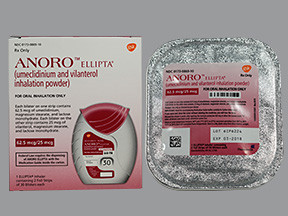UMECLIDINIUM/VILANTEROL DISK INHALER - ORAL
PHONETIC PRONUNCIATION: (ue-ME-kli-DIN-ee-um/vye-LAN-ter-ol)
COMMON BRAND NAME(S): Anoro Ellipta
GENERIC NAME(S): umeclidinium bromide/vilanterol trifenatate
Uses
USES: This product is used to control and prevent symptoms (such as wheezing and shortness of breath) caused by ongoing lung disease (chronic obstructive pulmonary disease-COPD, which includes chronic bronchitis and emphysema). Controlling symptoms of breathing problems helps you stay active. This inhaler contains 2 medications: umeclidinium and vilanterol. Both drugs work by relaxing the muscles around the airways in the lungs so they open up to make breathing easier. Umeclidinium belongs to a class of drugs known as anticholinergics, and vilanterol is a LABA medication (see also Warning section). Both drugs are also known as bronchodilators. This medication must be used regularly to be effective. It does not work right away and should not be used to relieve sudden shortness of breath. If sudden breathing problems occur, use your quick-relief inhaler as prescribed. This medication is not approved to treat asthma.
How to use UMECLIDINIUM/VILANTEROL DISK INHALER - ORAL
HOW TO USE: Read the Medication Guide and the product instructions provided by your pharmacist before you start using this medication and each time you get a refill. If you have any questions, ask your doctor or pharmacist. Inhale this medication by mouth as directed by your doctor, usually once daily. Do not open the cover of the inhaler until you are ready to use it. Each time you open the cover, you prepare a dose of the medication. If you open and close the cover without inhaling the medication, you will lose the dose. To avoid wasting a dose, do not close the cover until after you have inhaled the medication. You may or may not taste/feel the drug when you inhale. Do not exhale into the device. Use this medication regularly to get the most benefit from it. Use it at the same time every day. Do not use it more than one time each day. Do not increase your dose, use this medication more often, or stop using it without first consulting your doctor. Your condition will not improve any faster, and your risk of side effects will increase. If you are using other inhalers at the same time, wait at least 1 minute between the use of each medication. If you have been using a quick-relief inhaler (such as albuterol, also called salbutamol in some countries) on a regular daily schedule (such as 4 times daily), you must stop this schedule and only use the quick-relief inhaler as needed for sudden shortness of breath. Consult your doctor for details. Learn which of your inhalers you should use every day and which you should use if your breathing suddenly worsens (quick-relief drugs). Ask your doctor ahead of time what you should do if you have new or worsening cough or shortness of breath, wheezing, increased sputum, waking up at night with trouble breathing, if you use your quick-relief inhaler more often, or if your quick-relief inhaler does not seem to be working well. Learn when you can treat sudden breathing problems by yourself and when you must get medical help right away. Tell your doctor if your condition does not improve or if it worsens.
Side Effects
Precautions
Interactions
Overdose
Images
Reviews
Faq for UMECLIDINIUM/VILANTEROL DISK INHALER - ORAL
Umeclidinium/Vilanterol Disk Inhaler is used to manage and prevent symptoms of asthma and COPD, such as wheezing, shortness of breath, and chest tightness.
Umeclidinium is an anticholinergic drug that helps relax the muscles around the airways, allowing for easier breathing. Vilanterol, on the other hand, is a long-acting beta agonist (LABA) that helps open up the air passages by relaxing the muscles in the airways.
Follow the instructions provided by your healthcare provider or the medication packaging. Usually, the inhaler is used once daily. Rinse your mouth with water after inhalation to prevent any potential side effects.
Common side effects may include cough, headache, throat irritation, and upper respiratory tract infection. Seek medical attention if you experience severe side effects such as chest pain, rapid heartbeat, or allergic reactions (rash, itching, swelling, severe dizziness).
You should discuss this with your healthcare provider. While there is limited data available, it is generally recommended to avoid using Umeclidinium/Vilanterol Disk Inhaler during pregnancy unless the potential benefits outweigh the risks. It is unknown if the medication passes into breast milk, so consult your doctor if you are breastfeeding.
Inform your doctor about all the medications you are taking, including prescription, over-the-counter (OTC), vitamins, and herbal supplements. Some drugs may interact with Umeclidinium/Vilanterol Disk Inhaler, so it is essential to provide a comprehensive list to your healthcare provider.
Warning
WARNING: One ingredient in this product is vilanterol. It belongs to the class of drugs known as long-acting beta agonists (LABAs). Rarely, people with asthma who use LABA medications have had serious (sometimes fatal) asthma-related breathing problems. Umeclidinium/vilanterol is not approved to treat asthma.
Disclaimer
IMPORTANT: HOW TO USE THIS INFORMATION: This is a summary and does NOT have all possible information about this product. This information does not assure that this product is safe, effective, or appropriate for you. This information is not individual medical advice and does not substitute for the advice of your health care professional. Always ask your health care professional for complete information about this product and your specific health needs.

No Reviews Yet